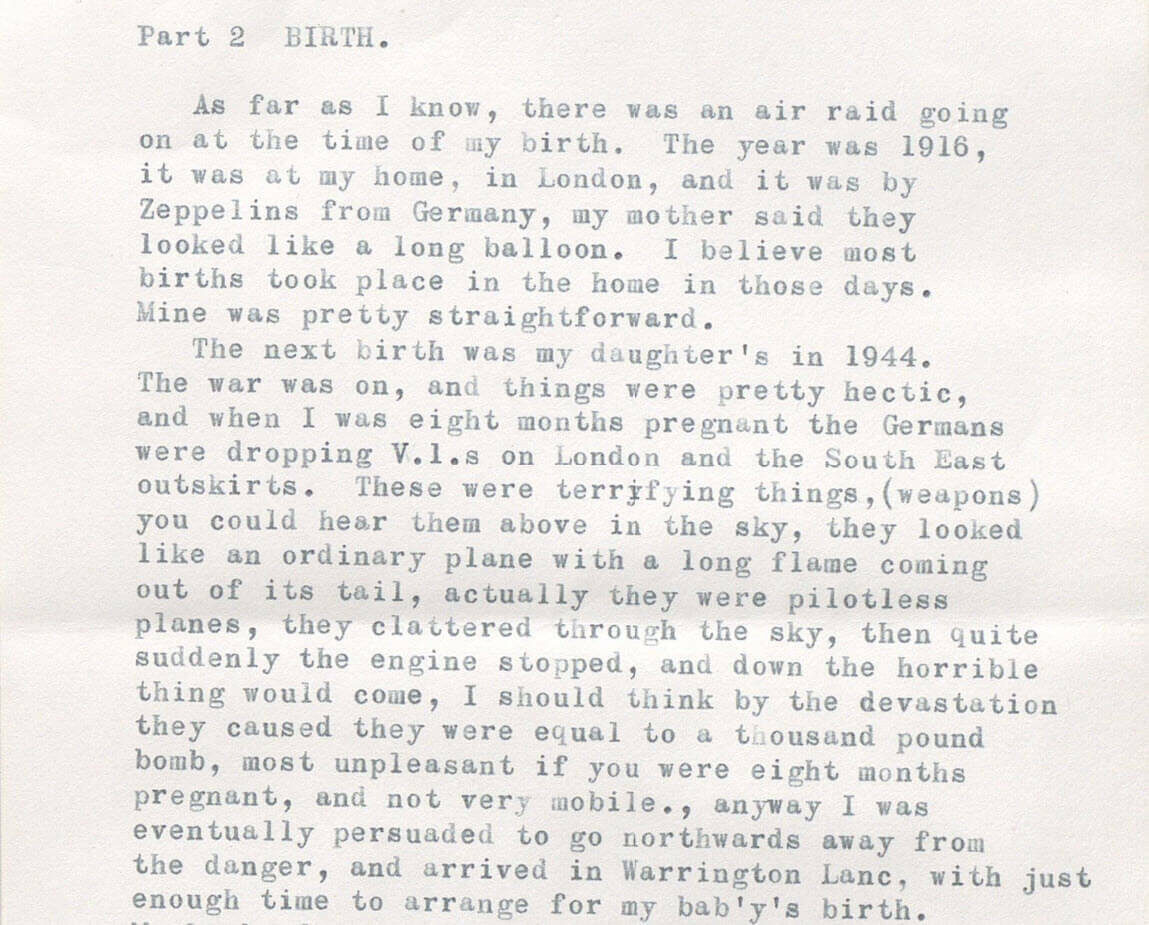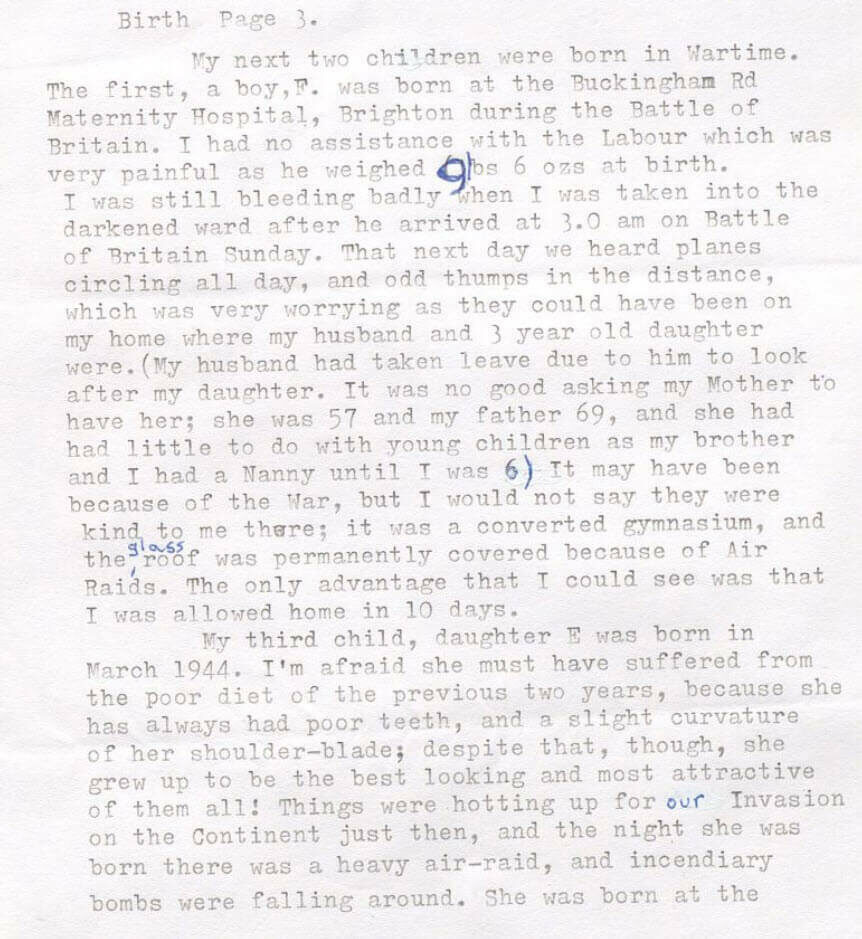Call the midwife! Birth through the generations of the Mass Observation Project
“In a pandemic, babies don’t stop coming” commented a midwife from Bradford Royal Infirmary in a 2020 BBC interview.
It’s a simple statement, and one which resonates with the prosaic incongruity of everyday life in the midst of so much uncertainty - there seems no better time than women’s history month to turn to narratives regarding this constant of human experience in 1993 directive on “Birth” from the newly released Mass Observation Project Module II: 1990s.
The directives are letters sent out by the Mass Observation Panel several times a year, asking participating members of the public (the ‘observers’) for their thoughts and feelings on particular subjects. Often, these subjects relate to current events and trends, but the “Birth” directive takes a more personal approach.

Excerpt from Part 2 of the Autumn/Winter 1993 directive. Image © Mass Observation Archive Trustees. Further reproduction is prohibited without permission.
In their exhibition for the new collection, Jessica Scantlebury and Kirsty Pattrick of the Mass Observation Archive note that the 90s saw some changes in the shape of the project. Dorothy Sheridan had taken over the running of the archive at the start of the decade, and one of the first directives she issued was on the topic of “Close Relationships”.
This was to be the first of more ‘life story narrative’ directives which, alongside others on events which we now consider to be key historical, political and cultural moments of the decade, ranged from nostalgic questions about “Growing Up” to the rather scandalous directive on “Having an Affair”.
The “Birth” directive takes a deep dive into the multi-generational experience. It asks after the respondents’ own births – what were their mothers’ experiences, their own? What advice did they give or receive, and how did they approach parenthood?
The responses, from men and women alike, are frequently shocking, hilarious, and deeply touching. If babies don’t stop coming during a pandemic then neither, apparently, do they stop coming through air raids, dog walks, family holidays - or even tours by the housing association, as responder H2577 can attest regarding the birth of her first child in 1985.

From observer H2577's response to the Autumn/Winter 1993 directive. Image © Mass Observation Archive Trustees. Further reproduction is prohibited without permission.
T1826 has a bracing response to the directive which resonates with those of us who struggle with society’s assumptions about maternal instinct, and her frank approach to the universal appearance of a new-born infant is emblematic of the blunt humour which runs through the entirety of the Mass Observation Archive.

From observer T1826's response to the Autumn/Winter 1993 directive. Image © Mass Observation Archive Trustees. Further reproduction is prohibited without permission.
Many observers, however, had more personal narratives to share, and some of their stories now date back over a century. M382 relates the story of her own birth during an air raid in 1916 and describes her experience of pregnancy during the Blitz.

From observer M382's response to the Autumn/Winter 1993 directive. Image © Mass Observation Archive Trustees. Further reproduction is prohibited without permission.
Nor is this the only dramatic wartime birth story. G1483 gave birth to two of her four children during wartime, one during the Battle of Britain, and another on a night with a heavy air raid when “incendiary bombs were falling around”.

From observer G1483's response to the Autumn/Winter 1993 directive. Image © Mass Observation Archive Trustees. Further reproduction is prohibited without permission.
There are many light-hearted moments in the responses - M1171 recalls her waters breaking at 2:00 am and by the time the ambulance arrived she was taking the dog for a walk, much to the consternation of the emergency responders. More canine exploits feature in B1509’s response: he and his wife had sent out his stepdaughter for a dog walk when she went into labour with her second child – and the baby enjoyed a very warm welcome from the family pet.

From observer B1509's response to the Autumn/Winter 1993 directive. Image © Mass Observation Archive Trustees. Further reproduction is prohibited without permission.
For some Mass Observers, however, the birth directive proved a difficult topic. Many women write in about their experiences with stillbirths and abortions or struggles with fertility. B36 writes about losing her three children, two just after birth and one during pregnancy:
This directive has made me cry, but I had to answer it. So perhaps someone else somewhere can understand the heartbreak.
B36 went on to adopt two children and writes that “it all ended happily”. It is a reminder, however, that it is not just the process of birth that makes a parent. Observers write frankly of their fears about parenthood, their relationships with their own parents and siblings, and the struggle of balancing childcare with a job or partner.
As Mother’s Day draws close, still as strange and socially distanced for many of us as it was last year, it’s good to have a reminder that some things remain universal, and that the highs and lows of human experience don’t stop coming, even – or especially – during a pandemic.
About the collection
Mass Observation Project, module II is out now.
Recent posts

The blog highlights American Committee on Africa, module II's rich documentation of anti-apartheid activism, focusing on the National Peace Accord, global solidarity, and student-led divestment campaigns. It explores the pivotal role of universities, protests, and public education in pressuring institutions to divest from apartheid, shaping global attitudes toward social justice and reform.

This blog examines how primary sources can be used to trace the impact of young voices on society, particularly during pivotal voting reforms in the UK and the US. Explore materials that reveal insights into youth activism, intergenerational gaps, and societal perceptions, highlighting their interdisciplinary value for studying youth culture, activism, and girlhood across history.
